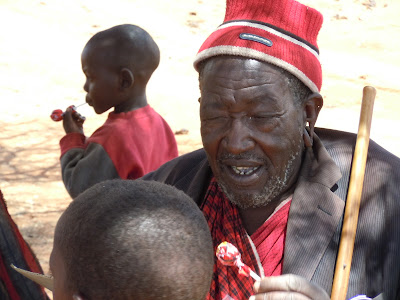 |
| Sanjoy and Oyaya work with Paulina to update the KWGP database. |
I promised an update and can give you some details today. The program began in October 2010 with 15 women each receivng 2 female goats. These are the statistics to date: the women are caring for a total of 59 goats; 11 males have been sold during the past year, 10 females have been given away, 17 females are pregnant, and 12 goats have died (2 eaten by a cheetah). Four women have paid for memberships and are awaiting goats, as well as a number of interested women who have not yet paid.
 |
| Grandmothers have milk for the young children in their care. |
At a general meeting, a number of the women shared how they are using the money from the sale of goats. Uniforms have been bought for school, iron sheets have been added to houses, and food has been purchased for the family. Two women talked excitedly about soon finishing the payment of their ‘debt’ – giving away 2 first born females to a new woman in the program.
 |
| The founding KWGP group members. |
Self esteem is a very tangible by-product for the KWGP women. You can see it in their eyes and hear it in their voices. This is empowerment on a very small scale that has the potential to spill over into other areas of the women's lives. We hope it is just the beginning of great things to come.














